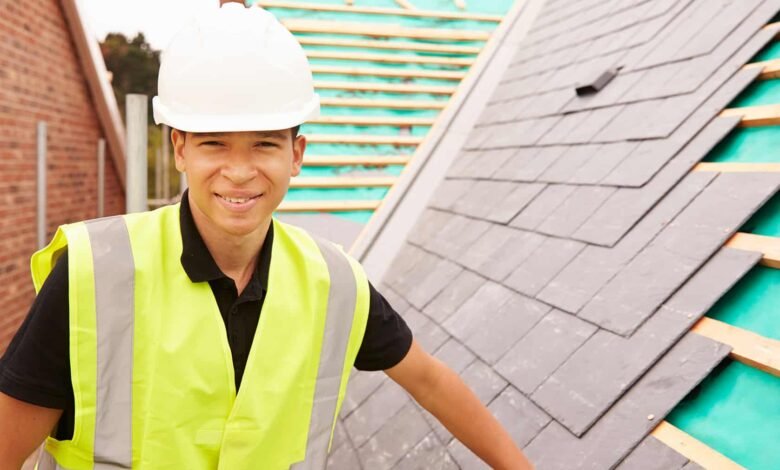How to Get a Roofing License: Requirements, Steps, and Tips

If you’re wondering how to get a roofing license, the answer depends on where you live and the type of roofing work you plan to do.
Some states issue licenses at the state level, while others leave it to local counties or municipalities. A few states don’t even require a roofing-specific license at all.
Because the rules vary so much, getting licensed can feel confusing.
This guide breaks down everything you need to know—why a roofing license matters, the most common requirements, and the exact steps to apply—so you can navigate the process with confidence and start growing your roofing business.
Why You Need a Roofing License

It sounds like a lot of trouble to go through to get a roofing license. So, is it really necessary? Do you need a license to work as a roofer?
The simple answer is “yes.” If you’re truly committed to the trade in a professional capacity, licensure is a must. A license is essentially a legal permit to work roofing jobs. It’s also a certificate of competence, proving you’re indeed a skilled and qualified roofer.
Here are five reasons why a roofing license is important:
Meet Legal Compliance
Most states and local jurisdictions require roofing contractors to have valid licenses. Unlicensed roofers may face legal action, including fines, contract cancellation, or even jail time.
The state of California, for example, does not take lightly to unlicensed contractors. Roofers operating without a license could face misdemeanor charges, carrying a potential sentence of up to six months in jail and fines of up to $20,000.
A license puts your roofing business on the right side of the law. It also arms you with essential legal power. For example, licensed contractors can pursue payment for their work in court or contest contractual disagreements in a legal setting.
Gain Access to Larger Roofing Jobs
Lacking a license can limit you to small, low-paying roofing jobs. In Mississippi, for example, you’ll need a license from the Mississippi State Board of Contractors (MSBOC) to work on commercial roofing jobs exceeding $50,000 or residential jobs over $10,000. North Dakota, Iowa, and many other US states have similar requirements.
In jurisdictions with such requirements, a license is your ticket to high-paying roofing jobs.
Choose Between Residential and Commercial Contracts
Some jurisdictions have a clear-cut distinction between commercial and residential contractors.
Take the state of Louisiana, for example. The Louisiana State Licensing Board for Contractors (LSLBC) provides three types of licenses to roofers: Residential, Commercial, and Home Improvement. Each type of license is unique and has its own set of requirements.
Depending on the local licensure laws, a roofing license may be marked for either residential or commercial roofing. You may also need specific licenses for certain types of roofing jobs or to handle certain roofing materials, such as asbestos.
Reassure Clients
A roofing license is generally recognized as a mark of competence. It demonstrates your expertise, skills, and credibility as a professional roofer. That instills confidence and trust in your brand. In the client’s mind, a license says, “The roofer knows what they’re doing.”
Certification or licensure can even give you a competitive advantage. That piece of paper helps build your reputation as a knowledgeable and proficient roofer.
Become Eligible for Insurance Coverage
Contractors, including roofers, often require a license to qualify for insurance coverage. Some insurers won’t cover unlicensed contractors for liability or workers’ compensation. Such is the case in states or jurisdictions where contractor licensing is a legal requirement.
Additionally, some manufacturers will only honor warranties if their products were installed by a licensed roofer.
RELATED ARTICLE — How to Bid a Roofing Job: 6 Easy Steps for Contractors
Roofing License Requirements

Let’s now talk about what you need to obtain a roofing license.
The requirements for licensure vary widely between states and jurisdictions. Most states don’t even have specific licenses for roofers. In most places, all you’ll need is a general contractor license, which can be residential, commercial, or unspecified.
For the purposes of this article, we’ll not focus on a specific state, city, town, or county. Instead, let’s discuss some of the general roofing license requirements.
Training and Work Experience
No one will ask to see your high school diploma or college degree. However, most states require roofers to complete formal trade training to earn a license. That means taking an exam to prove that you are indeed proficient in the roofing business.
In most places, the exam is a basic trade exam. However, some states, such as Louisiana, California, and Mississippi, also test roofers on business management and business law. The exams may be administered by local authorities or third-party examiners such as PSI.
Experience also matters in some jurisdictions, especially those with tiered license structures. In Nevada, for example, contractors must demonstrate a minimum of four years of experience within the past 15 years to be eligible for a license application.
License Application Fees
Roofing licenses are not free. You must pay a small fee for the application or facilitation of the license. Depending on where you apply from, that fee can range from a few tens of dollars to a few hundred. For instance, in Rhode Island, you’ll pay $400 for a commercial roofing license.
Business Registration
In most states, counties, and cities, you’ll need a business permit for your roofing venture. Mind you, a business license or permit is not the same as a roofing license.
A business permit/license simply allows you to conduct business within your jurisdiction. You get it by registering the business with local registrars at the state, county, or municipal level. That basically gives you the right to exchange your roofing services for money.
Financial Solvency
Some jurisdictions require new roofers to demonstrate their company’s financial health. Can the roofing business meet its long-term financial obligations?
The proof usually comes in the form of references and bonds. Bonding requirements and amounts vary between states and other jurisdictions.
In the state of Washington, for example, you must purchase a $15,000 surety bond to register as a specialized roofing contractor. The bond is a promise to the state that you’ll meet all your obligations as a business and a professional roofer.
Insurance
Insurance is a common requirement in contractor licensure. Depending on where you register the business and how it’s structured, you may need to purchase general or professional liability insurance. And unless you’re working in Texas, you’ll need workers’ compensation insurance if you have employees.
Insurance is actually for your own good. It covers your business against financial and legal damages should something go wrong. It also provides some level of assurance and safety guarantee to clients as you work on their roof.
FROM ONE OF OUR PARTNERS — 9 Essential Elements Every Roofing Contract Should Include
Step-by-Step Process for Getting a Roofing License

So, what do you have to do to become a licensed roofer?
Well, the roofing license application process varies greatly depending on the licensing body. But here is a general breakdown of how to get a roofing license:
1. Research Local Licensing Rules
Find out the specific licensing requirements for roofing contractors in your state, city, or county. We’ve already listed some of the general contractor licensing requirements. However, not all of these may apply to you. Or, there might be other requirements that we’ve not mentioned here.
The best thing to do is to head over to your local registrar’s office and ask around. You could also look up your location’s licensure requirements online. It may be helpful to consult with other contractors in your area, too.
2. Confirm You Meet Eligibility Requirements
Are you eligible for a roofing license?
Check whether you meet all the roofing license requirements. If you do not, take the necessary steps to change that. For example, if you’ve not yet registered your business, get on it. Also, set aside sufficient funds to see the application through.
However, some licensing requirements might be out of your reach. Say the license requires four years of experience, and you’ve only been in roofing for two years. There’s really nothing you can do but press on to reach that work experience threshold.
3. Complete Required Training or Apprenticeships
Most states and local jurisdictions do not explicitly require that roofers undergo any formal trade training. However, they will test your competence as both a roofer and an entrepreneur. Besides, how else will you learn the roofing business?
Sign up for roofing training (if necessary). You can do so by taking a course or an apprentice position. Gain all the essential skills and knowledge to become a qualified roofer.
4. Prepare and Submit Your Application
Next, prepare and submit your roofing license application. Most registrars have online portals where applicants can fill out forms and submit documents. Though in some places, applications are done the old-fashioned way on paper.
Double-check the application form to ensure everything is in order. Even the slightest mistakes here can lead to cancellation and unwanted delays.
5. Pass the Roofing License Exam
As we mentioned earlier, some registrars require license applicants to sit an exam. This could be one or more exams testing your knowledge of the roofing trade, specific skills, or business in general.
Depending on the exam provider, you can take the exam online or in person. And just like any exam, you must hit a certain score to pass.
6. Pay All Licensing Fees
Once you’ve passed the exam, you’re well on your way to getting a license. All you have to do is pay a licensing fee, and you’re done.
Again, the fee amount varies widely between states, cities, and counties. However much it is, there’s no way around paying.
7. Await Approval
You’ve done your part. Now wait for the authorities to do their thing.
A contractor license goes through several approval stages. Someone has to manually review each application to ensure that the details are correct and all the documents are legitimate. A decision is then reached on whether the applicant deserves a license. All this takes time, anywhere from a couple of days to a few weeks.
The application can be approved or rejected (fingers crossed for approval). If rejected, the licensing body will probably tell you why and provide avenues for appeal or resubmission. License rejections mostly stem from basic errors, such as inconsistencies and omissions.
RELATED ARTICLE — Roof Replacement Guide for Contractors: Steps and Costs
Roofing License Exams: What to Expect

A licensing exam, such as the Contractors State License Board (CSLB) exam, is a standardized, well-structured trade exam. These exams test your knowledge as a contractor, roofer, and entrepreneur.
They are pretty straightforward exams, too. You get dozens of questions on various topics, you’re allocated a time (1–2 hours), and there’s a minimum pass score (usually above 70%).
Don’t get too anxious about the test. The questions are on things you already know. And the average pass rate for trade exams is pretty high.
Follow these tips on how to prepare effectively for licensing exams:
- Study for the exam using coursework materials and study guides.
- Familiarize yourself with the exam format, structure, and topics.
- Do a practice test before the actual exam.
- Get a good night’s sleep the night before the exam.
- Arrive early at the exam room.
- Listen to the examiner’s instructions and guidelines.
- Read each question carefully (more than once if necessary).
- Scan through the entire test before answering any questions.
- Tackle the questions you know first, and later answer those you skipped.
- Ensure you’ve answered every question to complete the test.
- Check your work thoroughly before submitting your exam.
FROM ONE OF OUR PARTNERS — How to Price Jobs as a General Contractor
Maintaining and Renewing a Roofing License
Getting a trade license is not a once-and-done deal. Contractor licenses are only valid for one or two years. That means you have to renew the license once it expires.
But don’t worry; renewing a roofing license is much easier. You only have to fill in an application and pay a fee. However, if it has been expired for too long, you may have to get a new license altogether.
You also have to take care of your roofing license. Violating local licensing laws can get your roofing license suspended or nullified. Issues with your surety bond, insurance, certifications, or work conduct can have your license taken away.
Also, keep advancing your skills and knowledge in the roofing industry. Doing so can make all the difference in meeting new and evolving licensure laws and requirements.
6 Tips to Speed Up the Roofing License Process
Follow these tips to get started on your roofing license today:
- Understand the contractor licensing laws and requirements in your state or local jurisdiction.
- Structure your business in a way that makes it easier to get licensed as a roofer.
- Register your business with the state before seeking a roofing license.
- Get ample training and experience in the roofing industry before applying for a license.
- Ensure you obtain certification for specialized services, such as solar PV installation and asbestos removal.
- Consult a licensing agent to help you navigate the licensing, registration, and certification landscape.













